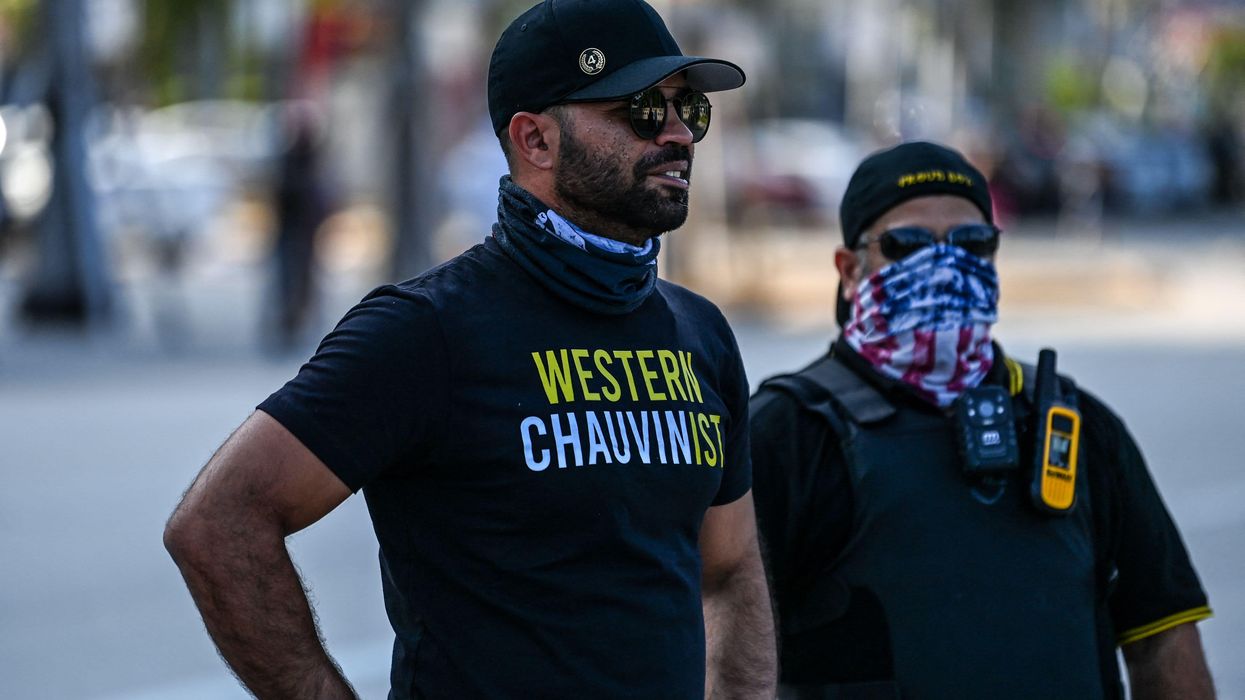Trump Names 22 Year-Old 'Intern' To Run DHS Counter-Terrorism Program
When Thomas Fugate graduated from college last year with a degree in politics, he celebrated in a social media post about the exciting opportunities that lay beyond campus life in Texas. “Onward and upward!” he wrote, with an emoji of a rocket shooting into space.
His career blastoff came quickly. A year after graduation, the 22-year-old with no apparent national security expertise is now a Department of Homeland Security official overseeing the government’s main hub for terrorism prevention, including an $18 million grant program intended to help communities combat violent extremism.
The White House appointed Fugate, a former Trump campaign worker who interned at the hard-right Heritage Foundation, to a Homeland Security role that was expanded to include the Center for Prevention Programs and Partnerships. Known as CP3, the office has led nationwide efforts to prevent hate-fueled attacks, school shootings and other forms of targeted violence.
Fugate’s appointment is the latest shock for an office that has been decimated since President Donald Trump returned to the White House and began remaking national security to give it a laser focus on immigration.
News of the appointment has trickled out in recent weeks, raising alarm among counterterrorism researchers and nonprofit groups funded by CP3. Several said they turned to LinkedIn for intel on Fugate — an unknown in their field — and were stunned to see a photo of “a college kid” with a flag pin on his lapel posing with a sharply arched eyebrow. No threat prevention experience is listed in his employment history.
Typically, people familiar with CP3 say, a candidate that green wouldn’t have gotten an interview for a junior position, much less be hired to run operations. According to LinkedIn, the bulk of Fugate’s leadership experience comes from having served as secretary general of a Model United Nations club.
“Maybe he’s a wunderkind. Maybe he’s Doogie Howser and has everything at 21 years old, or whatever he is, to lead the office. But that’s not likely the case,” said one counterterrorism researcher who has worked with CP3 officials for years. “It sounds like putting the intern in charge.”
In the past seven weeks, at least five high-profile targeted attacks have unfolded across the U.S., including a car bombing in California and the gunning down of two Israeli Embassy aides in Washington. Against this backdrop, current and former national security officials say, the Trump administration’s decision to shift counterterrorism resources to immigration and leave the violence-prevention portfolio to inexperienced appointees is “reckless.”
“We’re entering very dangerous territory,” one longtime U.S. counterterrorism official said.
The fate of CP3 is one example of the fallout from deep cuts that have eliminated public health and violence-prevention initiatives across federal agencies.
The once-bustling office of around 80 employees now has fewer than 20, former staffers say. Grant work stops, then restarts. One senior civil servant was reassigned to the Federal Emergency Management Agency via an email that arrived late on a Saturday.
The office’s mission has changed overnight, with a pivot away from focusing on domestic extremism, especially far-right movements. The “terrorism” category that framed the agency’s work for years was abruptly expanded to include drug cartels, part of what DHS staffers call an overarching message that border security is the only mission that matters. Meanwhile, the Trump administration has largely left terrorism prevention to the states.
ProPublica sent DHS a detailed list of questions about Fugate’s position, his lack of national security experience and the future of the department’s prevention work. A senior agency official replied with a statement saying only that Fugate’s CP3 duties were added to his role as an aide in an Immigration & Border Security office.
“Due to his success, he has been temporarily given additional leadership responsibilities in the Center for Prevention Programs and Partnerships office,” the official wrote in an email. “This is a credit to his work ethic and success on the job.”
ProPublica sought an interview with Fugate through DHS and the White House, but there was no response.
The Trump administration rejects claims of a retreat from terrorism prevention, noting partnerships with law enforcement agencies and swift investigations of recent attacks. “The notion that this single office is responsible for preventing terrorism is not only incorrect, it’s ignorant,” spokesperson Abigail Jackson wrote in an email.
Through intermediaries, ProPublica sought to speak with CP3 employees but received no reply. Talking is risky; tales abound of Homeland Security personnel undergoing lie-detector tests in leak investigations, as Secretary Kristi Noem pledged in March.
Accounts of Fugate’s arrival and the dismantling of CP3 come from current and former Homeland Security personnel, grant recipients and terrorism-prevention advocates who work closely with the office and have at times been confidants for distraught staffers. All spoke on condition of anonymity for fear of reprisal from the Trump administration.
In these circles, two main theories have emerged to explain Fugate’s unusual ascent. One is that the Trump administration rewarded a Gen Z campaign worker with a resume-boosting title that comes with little real power because the office is in shambles.
The other is that the White House installed Fugate to oversee a pivot away from traditional counterterrorism lanes and to steer resources toward MAGA-friendly sheriffs and border security projects before eventually shuttering operations. In this scenario, Fugate was described as “a minder” and “a babysitter.”
DHS did not address a ProPublica question about this characterization.
Rising MAGA Star
The CP3 homepage boasts about the office’s experts in disciplines including emergency management, counterterrorism, public health and social work.
Fugate brings a different qualification prized by the White House: loyalty to the president.
On Instagram, Fugate traced his political awakening to nine years ago, when as a 13-year-old “in a generation deprived of hope, opportunity, and happiness, I saw in one man the capacity for real and lasting change: Donald Trump.”
Fugate is a self-described “Trumplican” who interned for state lawmakers in Austin before graduating magna cum laude a year ago with a degree in politics and law from the University of Texas at San Antonio. Instagram photos and other public information from the past year chronicle his lightning-fast rise in Trump world.
Starting in May 2024, photos show a newly graduated Fugate at a Texas GOP gathering launching his first campaign, a bid for a delegate spot at the Republican National Convention in Milwaukee. He handed out gummy candy and a flier with a photo of him in a tuxedo at Trump’s Mar-a-Lago estate. Fugate won an alternate slot.
The next month, he was in Florida celebrating Trump’s 78th birthday with the Club 47 fan group in West Palm Beach. “I truly wish I could say more about what I’m doing, but more to come soon!” he wrote in a caption, with a smiley emoji in sunglasses.
Posts in the run-up to the election show Fugate spending several weeks in Washington, a time he called “surreal and invigorating.” In July, he attended the Republican convention, sporting the Texas delegation’s signature cowboy hat in photos with MAGA luminaries such as former Cabinet Secretary Ben Carson and then-Rep. Matt Gaetz (R-Fla.).
By late summer, Fugate was posting from the campaign trail as part of Trump’s advance team, pictured at one stop standing behind the candidate in a crowd of young supporters. When Trump won the election, Fugate marked the moment with an emotional post about believing in him “from the very start, even to the scorn and contempt of my peers.”
“Working alongside a dedicated, driven group of folks, we faced every challenge head-on and, together, celebrated a victorious outcome,” Fugate wrote on Instagram.
In February, the White House appointed Fugate as a “special assistant” assigned to an immigration office at Homeland Security. He assumed leadership of CP3 last month to fill a vacancy left by previous Director Bill Braniff, an Army veteran with more than two decades of national security experience who resigned in March when the administration began cutting his staff.
In his final weeks as director, Braniff had publicly defended the office’s achievements, noting the dispersal of nearly $90 million since 2020 to help communities combat extremist violence. According to the office’s 2024 report to Congress, in recent years CP3 grant money was used in more than 1,100 efforts to identify violent extremism at the community level and interrupt the radicalization process.
“CP3 is the inheritor of the primary and founding mission of DHS — to prevent terrorism,” Braniff wrote on LinkedIn when he announced his resignation.
In conversations with colleagues, CP3 staffers have expressed shock at how little Fugate knows about the basics of his role and likened meetings with him to “career counseling.” DHS did not address questions about his level of experience.
One grant recipient called Fugate’s appointment “an insult” to Braniff and a setback in the move toward evidence-based approaches to terrorism prevention, a field still reckoning with post-9/11 work that was unscientific and stigmatizing to Muslims.
“They really started to shift the conversation and shift the public thinking. It was starting to get to the root of the problem,” the grantee said. “Now that’s all gone.”
Critics of Fugate’s appointment stress that their anger isn’t directed at an aspiring politico enjoying a whirlwind entry to Washington. The problem, they say, is the administration’s seemingly cavalier treatment of an office that was funding work on urgent national security concerns.
“The big story here is the undermining of democratic institutions,” a former Homeland Security official said. “Who’s going to volunteer to be the next civil servant if they think their supervisor is an apparatchik?”
Season of Attacks
Spring brought a burst of extremist violence, a trend analysts fear could extend into the summer given inflamed political tensions and the disarray of federal agencies tasked with monitoring threats.
In April, an arson attack targeted Pennsylvania Gov. Josh Shapiro, a Democrat, who blamed the breach on “security failures.” Four days later, a mass shooter stormed onto the Florida State University campus, killing two and wounding six others. The alleged attacker had espoused white supremacist views and used Hitler as a profile picture for a gaming account.
Attacks continued in May with the apparent car bombing of a fertility clinic in California. The suspected assailant, the only fatality, left a screed detailing violent beliefs against life and procreation. A few days later, on May 21, a gunman allegedly radicalized by the war in Gaza killed two Israeli Embassy aides outside a Jewish museum in Washington.
June opened with a firebombing attack in Colorado that wounded 12, including a Holocaust survivor, at a gathering calling for the release of Israeli hostages. The suspect’s charges include a federal hate crime.
If attacks continue at that pace, warn current and former national security officials, cracks will begin to appear in the nation’s pared-down counterterrorism sector.
“If you cut the staff and there are major attacks that lead to a reconsideration, you can’t scale up staff once they’re fired,” said the U.S. counterterrorism official, who opposes the administration’s shift away from prevention.
Contradictory signals are coming out of Homeland Security about the future of CP3 work, especially the grant program. Staffers have told partners in the advocacy world that Fugate plans to roll out another funding cycle soon. The CP3 website still touts the program as the only federal grant “solely dedicated to helping local communities develop and strengthen their capabilities” against terrorism and targeted violence.
But Homeland Security’s budget proposal to Congress for the next fiscal year suggests a bleaker future. The department recommended eliminating the threat-prevention grant program, explaining that it “does not align with DHS priorities.”
The former Homeland Security official said the decision “means that the department founded to prevent terrorism in the United States no longer prioritizes preventing terrorism in the United States.”
Kirsten Berg contributed research.
Reprinted with permission from Alternet.











